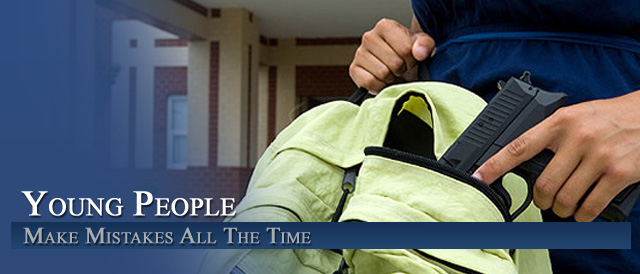
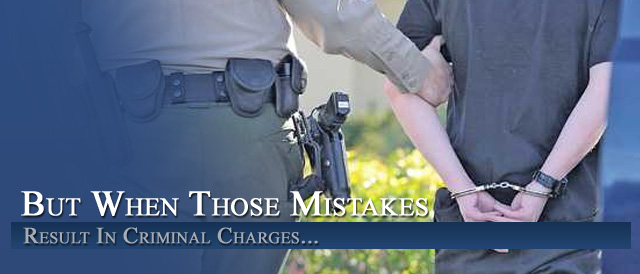
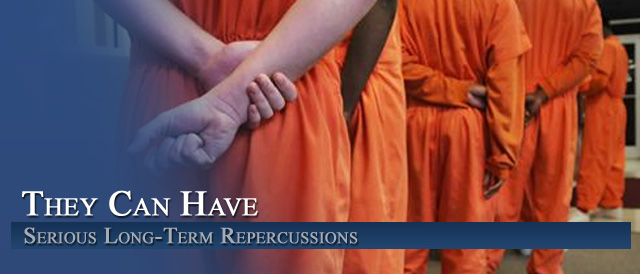
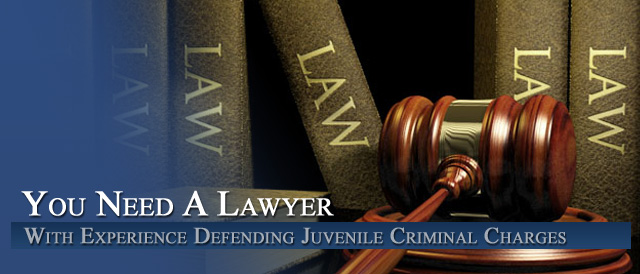
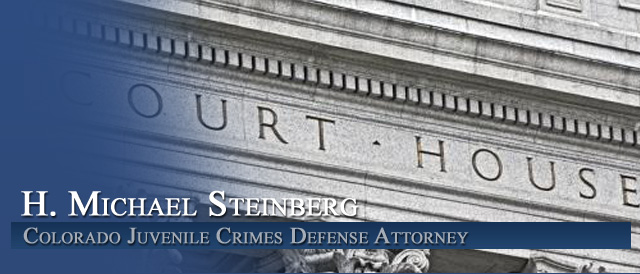
Understanding Colorado Juvenile Sentencing Part 1 – The Aggravated Juvenile Offender Law – 19-2-601
By H. Michael Steinberg Colorado Juvenile Criminal Defense Lawyer – Attorney
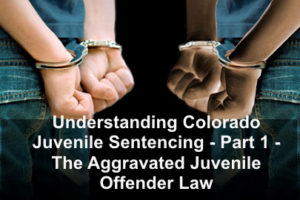 Understanding Colorado Juvenile Sentencing Part 1 – The Aggravated Juvenile Offender Law – Changes to the Colorado Juvenile Justice System in 2012 intelligently tempered harsh sentencing laws which were enacted during the so called “Summer of Violence” in 1993. As a senior prosecutor in Arapahoe county at that time, I recall prosecuting one of the first murders of a young teacher. Her death touched off a number of changes to Colorado juvenile law.
Understanding Colorado Juvenile Sentencing Part 1 – The Aggravated Juvenile Offender Law – Changes to the Colorado Juvenile Justice System in 2012 intelligently tempered harsh sentencing laws which were enacted during the so called “Summer of Violence” in 1993. As a senior prosecutor in Arapahoe county at that time, I recall prosecuting one of the first murders of a young teacher. Her death touched off a number of changes to Colorado juvenile law.
In 2012 the Colorado Children’s Code was amended in several positive ways for those juveniles accused of Colorado’s most serious juvenile crimes.
One of those laws is Colorado’s aggravated juvenile offender law.
Colorado’s Aggravated Juvenile Offender Statute
In Colorado, if a Juvenile is eligible by virtue of his or her conviction to be sentenced to the Division of Youth Corrections, that sentence is up to two years’ commitment to the Department of Human Services. However, when mandatory sentencing laws apply – laws such as the Colorado aggravated juvenile offender statute, the maximum term of commitment is increased.
Here is the relevant section of the now – amended – Colorado Aggravated Juvenile Offender Law (for the entire law – follows this link)……
(5)(a)(I) Upon adjudication as an aggravated juvenile offender:
[ HMS – Section 5 (a)(I) (A) applies to adjudications (convictions) just below the highest class of felonies – Class 1 and Class 2 felonies. This applies to felonies below the most serious of crimes. Here, even though the Juvenile may qualify for an Aggravated Juvenile Sentence – the Judge has DISCRETION and is not required to sentence the juvenile to a term in the Colorado Youth Corrections system.]
(A) For an offense other than an offense that would constitute a class 1 or 2 felony if committed by an adult, the court may commit the juvenile to the department of human services for a determinate period of up to five years;
[ HMS – Section 5 (a)(I)(B) applies to adjudications (convictions) for the second highest class of felonies – Class 2 felonies. Here the Judge has NO DISCRETION and is therefore required to sentence the juvenile to a term in the Colorado Youth Corrections system for a period of between 3 and 5 years.]
(B) For an offense that would constitute a class 2 felony if committed by an adult, the court shall commit the juvenile to the department of human services for a determinate period of at least three but not more than five years;
[HMS – Section 5 (a)(I)(C) applies to adjudications (convictions) for the highest class of felonies – Class 2 felonies. Here the Judge, again, has NO DISCRETION in imposing sentence and is therefore required to sentence the juvenile to a term in the Colorado Youth Corrections system for a period of between 3 and 7 years.]
(C) For an offense that would constitute a class 1 felony if committed by an adult, the court shall commit the juvenile to the department of human services for a determinate period of at least three but not more than seven years;
[HMS – Finally Section 5 (a)(I)(D) applies to adjudications (convictions) murder in the first degree or murder in the second degree, or sexual assault under section 18-3-402(3.5) or 18-3-402(4), C.R.S.. The Judge in this situation, where there are multiple convictions of these serious crimes, can “stack them” – that is run them consecutively – one after the other. There is no limit to the number of consecutive sentences – if the crimes qualify under this law.]
(D) When the petition alleges the offense of murder in the first degree or murder in the second degree, or sexual assault under section 18-3-402(3.5) or 18-3-402(4), C.R.S., and the juvenile is adjudicated a delinquent for either murder in the first degree or murder in the second degree, then the court may sentence the juvenile consecutively or concurrently for any crime of violence as described in section 18-1.3-406, C.R.S., or for a delinquent act contained in the petition for which the juvenile is an aggravated juvenile offender.
The Right To A Jury Of 12 In Colorado Aggravated Juvenile Offender Cases
Because of the nature of the mandatory sentencing in cases involving Juveniles charged with aggravated juvenile offender counts – Juveniles have a right to a trial by twelve jurors – a right that is denied to Juveniles in most Juvenile criminal cases.
Aging Out Of The Colorado Youth Offender System
The law will not permit a Juvenile to remain in a juvenile facility after the age of 21.
Colorado’s aggravated juvenile offender statute provides for a hearing – called a “20½ hearing” which his initiated by the Colorado Department of Human Services. The Department files a motion with the District Court. The issue – what happens when the CDHS loses jurisdiction over the youth.
To protect the rights of the juvenile, the Court appoints a lawyer to represent him or her. The Court then orders The law then requires a psychological evaluation and risk assessment to determine whether the youth “is a danger to himself or herself or to others.”
The issue: does the Court terminate jurisdiction over the juvenile? Or, does the Court transfer the youth into an facility for an adult criminal sanction.
Some of the issues the Court must decide after weighing each factor – include:
1. The psychological evaluation and risk assessment;
2. The nature of the crimes committed;
3. The youth’s behavior while in custody;
4. The possibility of rehabilitation; and
5. The last, and perhaps must important factor – whether the placement where the youth is most likely to succeed in reintegrating into the community.
If Judge decides that termination of the case is too risky – the Judge will transfer the youth to the adult system by sentencing the juvenile directly to adult parole, to community corrections, to the youthful offender system, or the department of corrections.
On the other hand, if the risks can be managed, a Judge can move the juvenile to an appropriate facility and even adjust -that is alter – the length of the original sentence.
Prior to this procedure, a Judge was limited to immediate release (release at age 21), or adult prison. Today, under the aggravated juvenile offender statute, DHS can transfer a child to adult prison after the child turns 18 years of age if he or she is “no longer benefitting from its programs” however today the child is entitled to a careful and well reasoned decision as to the best course of action.
An Approach That Gives Judges The Discretion They Need In The Best Interests Of Colorado’s Troubled Youth
Today’s Colorado’s aggravated juvenile offender statute, unlike prior versions of the law, now provides for an individualized assessment of each juvenile that not only applies safeguards which have been designed to determine to the best course of action for each child but which also balances the rehabilitation of that child against the – what the laws always refer to as of paramount importance- the interests of public safety.
Understanding Colorado Juvenile Sentencing Part 1 – The Aggravated Juvenile Offender Law 19-2-601
If you found any of the information I have provided on this web page article helpful please click my Plus+1 or the Share buttons for Twitter and Facebook below so that others may also find it.
The reader is admonished that Colorado criminal law, like criminal law in every state and at the Federal level, changes constantly. The article appearing above was accurate at the time it was drafted but it cannot account for changes occurring after it was uploaded.
If, after reading this article, you have questions about your case and would like to consider retaining our law firm, we invite you to contact us at the Steinberg Colorado Criminal Defense Law Firm – 303-627-7777.
Never stop fighting – never stop believing in yourself and your right to due process of law. You will not be alone in court, H. Michael will be at your side every step of the way – advocating for justice and the best possible result in your case. H. Michael Steinberg is passionate about criminal defense. His extensive knowledge and experience of Colorado Criminal Law gives him the edge you need to properly handle your case
 ABOUT THE AUTHOR: H. Michael Steinberg – Email The Author at:
ABOUT THE AUTHOR: H. Michael Steinberg – Email The Author at:
A Denver Colorado Criminal Defense Lawyer – or call his office at 303-627-7777 during business hours – or call his cell if you cannot wait and need his immediate assistance – please call 720-220-2277.
“A good criminal defense lawyer is someone who devotes themselves to their client’s case from beginning to end, always realizing that this case is the most important thing in that client’s life.”
You should be careful to make a responsible choice in selecting a Colorado Criminal Defense Lawyer. We encourage you to “vet” our firm. Over the last 35 plus years – by focusing ONLY on Colorado criminal law – H. Michael has had the necessary time to commit to the task of constantly updating himself on nearly every area of criminal law, to include Colorado criminal law and procedure and trial and courtroom practice.
Putting more than 40 years of Colorado criminal defense experience to work for you.
H. Michael works hard to get his clients the best possible results in and out of the courtroom. He has written, and continues to write, extensively on Colorado criminal law and he hopes this article helps you in some small way – Understanding Colorado Juvenile Sentencing Part 1 – The Aggravated Juvenile Offender Law § 19-2-601.
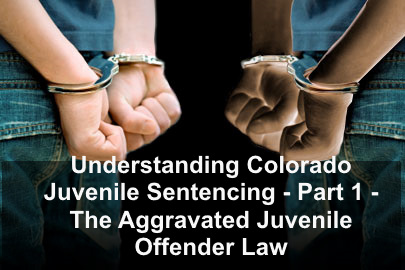
Other Articles of Interest:
- The Colorado Juvenile Criminal Sentencing Hearing – Part III of III
- Sentencing – Persons Eighteen Years of Age or Older – County Jail – Community Corrections 19-2-910.
- Sentencing – Special Offenders – 19-2-908
- The Filing Of Charges Decision In Colorado Juvenile Criminal Cases – The Charging Decision – Plea Bargaining Part I of II
- Sentencing – Fines 19-2-917












